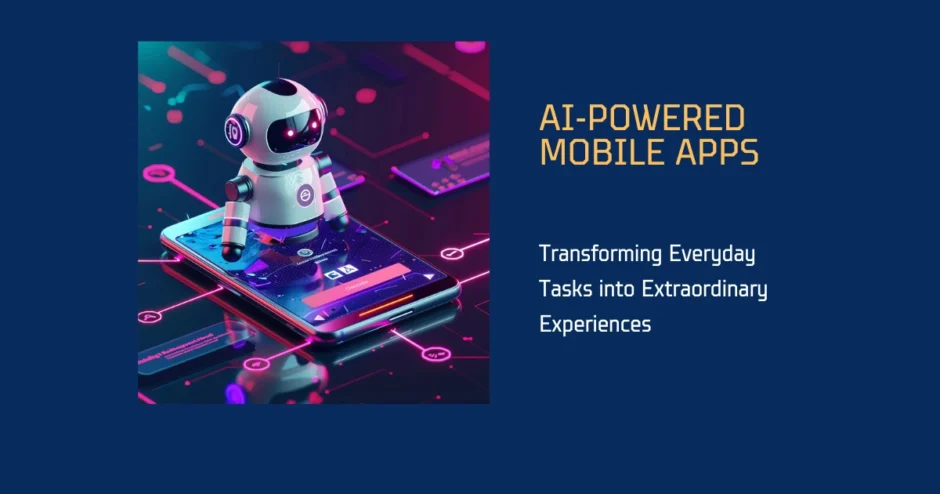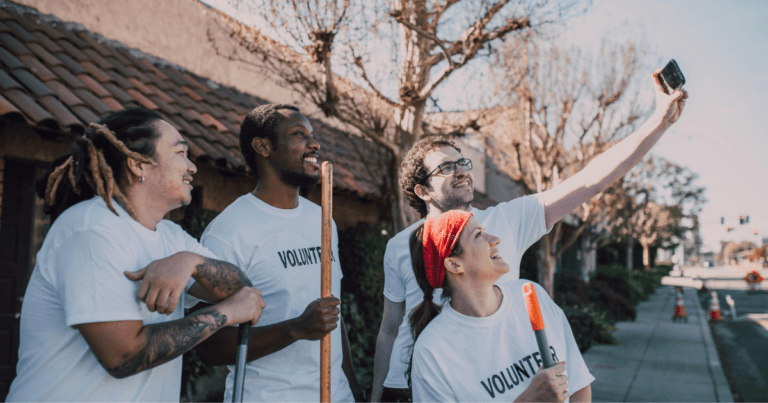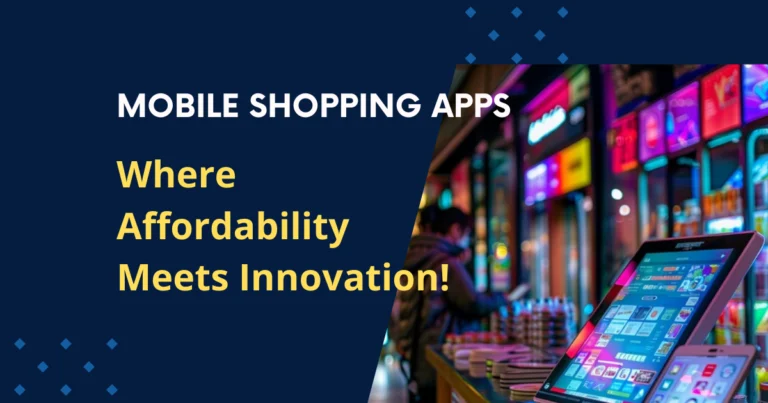AI-Powered Mobile Apps: Revolutionizing Daily Life for a Better Future

In today’s fast-paced world, artificial intelligence (AI) is no longer a far-fetched concept reserved for sci-fi movies. Instead, it’s a reality that has seamlessly integrated into our daily routines, and at the forefront of this revolution are AI-Powered Mobile Apps. These applications are redefining how we work, create, stay healthy, and manage our lives, making technology smarter and more user-friendly.
AI-Powered Mobile Apps are more than just technological novelties. They offer real-world solutions that improve productivity, foster creativity, and promote well-being. Let’s explore the profound impact of these apps across various aspects of life, and take a glimpse into the future possibilities that AI holds for mobile technology.
Table of Contents
AI for Productivity: Streamlining Your Workflow
One of the most notable benefits of AI-Powered Mobile Apps is their ability to enhance productivity by automating tasks, managing schedules, and optimizing workflows. By doing the heavy lifting, these apps allow us to focus on more strategic and creative endeavors.


Virtual Assistants
Virtual assistants like Siri, Google Assistant, and Alexa have become staples in households and workplaces. These AI-driven apps respond to voice commands and can perform a wide range of tasks, from setting reminders and sending messages to controlling smart home devices. By leveraging Natural Language Processing (NLP), these assistants are increasingly intuitive, understanding context and responding accurately to complex requests.
Imagine waking up and asking your virtual assistant for a summary of your day. It can inform you about the weather, your meetings, and even remind you to pick up groceries. This level of convenience transforms mundane routines into effortless interactions, making everyday tasks more efficient.
Task Management Tools
Gone are the days of simple to-do lists. Task management apps like Todoist and Microsoft To Do have evolved with AI capabilities to organize and prioritize tasks intelligently. These apps analyze your behavior to suggest optimal task sequences and deadlines. By understanding your work habits, they can help you achieve a more balanced and productive workflow.
For instance, if you have a history of completing specific tasks faster in the morning, these apps can schedule high-priority work for that time. This intelligent planning allows for better time management and ensures that deadlines are met without stress.
Writing and Content Creation Tools
Content creation has been revolutionized by AI-Powered Mobile Apps like Grammarly and Jasper.ai. Grammarly uses AI to detect grammatical errors, suggest style improvements, and enhance clarity. It goes beyond simple spell checks, offering advanced writing feedback that elevates the quality of your work. Meanwhile, Jasper.ai takes content creation to the next level, generating creative writing formats, including blog posts, social media content, and marketing copy, all tailored to user preferences.
These tools are invaluable for professionals, students, and writers who want to produce polished content quickly and efficiently. By automating parts of the writing process, they free up time for more strategic thinking and creativity.
Smart Calendars and Scheduling
AI technology has revolutionized scheduling with apps like Google Calendar and Calendly. These smart calendars manage time zones, suggest optimal meeting times, and automatically reschedule appointments when conflicts arise. They can even analyze your daily habits and recommend breaks to maximize productivity.
For example, if you frequently have back-to-back meetings, your AI-powered calendar may suggest blocking out time for a lunch break or focus time. This proactive approach to time management ensures a more balanced and efficient workday.

AI for Creativity: Unleashing Your Inner Artist
Creativity is no longer confined to those with advanced technical skills. AI-Powered Mobile Apps have democratized creative processes, making it easy for anyone to design, compose, and produce high-quality art and content.
Design Tools with AI Capabilities
Design apps like Adobe Photoshop and Canva have incorporated AI features that simplify complex design tasks. From automatic background removal to intelligent object selection, these tools make it easy to create stunning visuals with minimal effort. Canva’s AI design suggestions ensure that even beginners can produce professional-looking content in seconds.
AI also enhances photo editing by using machine learning to detect and improve flaws in images. Features like content-aware fill and automatic retouching allow users to achieve results that once required extensive manual work.
Music and Art Creation
For music enthusiasts, apps like GarageBand and MuseNet are game-changers. They use AI to compose music, allowing users to experiment with different instruments, styles, and genres. Whether you’re a seasoned musician or a complete novice, these apps make it possible to create unique compositions effortlessly.
In the visual arts, AI-powered tools like Prisma and DeepArt transform photos into paintings in the style of famous artists. This creative fusion of technology and art makes it accessible for anyone to produce masterpieces with a simple tap on their screen.
Personalized Learning and Skill Development
AI has also revolutionized art and music education. Apps like Yousician adapt lessons based on a learner’s skill level and progress. By providing instant feedback, these apps offer a personalized learning experience that keeps users engaged and motivated. This tailored approach ensures that learners improve at their own pace, making skill development more enjoyable and effective.

AI for Personal Well-being: Enhancing Your Life
The impact of AI extends beyond productivity and creativity; it’s also transforming the way we approach health and wellness. AI-Powered Mobile Apps provide personalized guidance for physical and mental well-being, making self-care more accessible and effective.
Mental Health Support
Apps like Woebot and Youper use AI to deliver mental health support through conversational chatbots. These apps leverage Machine Learning to understand user emotions and offer personalized advice, coping strategies, and relaxation techniques. They can even detect early signs of anxiety or depression, providing timely support to those in need.
AI-powered mental health apps are a valuable resource for people who may not have immediate access to professional help. By offering 24/7 support, they make mental health care more approachable and destigmatized.
Fitness and Health Optimization
Fitness apps like Fitbod and Nike Training Club use AI to tailor workout plans based on user performance and goals. These apps analyze past workouts to suggest new routines that target specific muscle groups, ensuring a well-rounded fitness regimen. Meanwhile, MyFitnessPal uses AI to track nutritional intake and offer insights into dietary habits, helping users make informed choices for a healthier lifestyle.
AI-powered nutrition apps can even analyze your eating patterns and suggest meal plans that align with your fitness goals. By understanding your body and habits, these apps provide a personalized health journey that adapts as you progress.
Lifestyle and Nutrition Guidance
AI’s influence on wellness extends to apps like Nutrino, which provide personalized nutrition advice. These apps take into account dietary restrictions, allergies, and health conditions to suggest meals that are both nutritious and enjoyable. They can even monitor hydration levels and remind you to drink water based on your activity level and environment.
The integration of AI into health and fitness apps ensures that wellness becomes a holistic and personalized experience, empowering users to lead healthier and more balanced lives.

The Future of AI-Powered Mobile Apps: A Glimpse into Tomorrow
The future of AI-Powered Mobile Apps is bright, with advancements on the horizon that will make technology even more intuitive and indispensable.
Advanced Natural Language Processing
We can expect major strides in Natural Language Processing (NLP), allowing AI assistants to have more meaningful and context-aware conversations. These advancements will make virtual assistants more human-like, understanding nuanced language and emotions, and responding with empathy and precision.
Greater Device Integration
AI will enable deeper integration across devices, creating a connected ecosystem that enhances convenience. Imagine a world where your smart fridge suggests recipes based on its contents, your car’s AI recommends the fastest route to avoid traffic, and your smartwatch monitors your health in real-time, alerting you to potential issues.
This seamless connectivity will transform daily life, making it more efficient and tailored to individual needs.
Addressing Ethical Challenges
As AI technology evolves, addressing ethical concerns will be crucial. Data privacy, algorithmic bias, and the ethical use of AI will remain hot topics. Developers and regulators must work together to create transparent, accountable, and fair AI systems. By prioritizing ethical AI development, we can ensure that these technologies benefit society without infringing on privacy or amplifying inequalities.
Real-World Examples: AI-Powered Mobile Apps Across Domains
Let’s take a look at how AI-Powered Mobile Apps are making a difference across various domains:
Productivity Apps
- Grammarly: Enhances writing with AI-driven grammar and style suggestions.
- Notion: An all-in-one workspace that uses AI to connect tasks, notes, and projects.
- Clockify: A time-tracking app that provides insights to improve productivity.
Creative Apps
- Adobe Photoshop: Uses AI for smart object selection, facial recognition, and photo retouching.
- Canva: Offers AI-powered design suggestions for stunning visuals.
- GarageBand: AI-driven music composition for easy and creative music-making.
Health and Fitness Apps
- Fitbit: Monitors health metrics and uses AI to provide personalized insights.
- Headspace: Delivers guided meditation and mindfulness exercises using AI to personalize experiences.
- MyFitnessPal: Tracks diet and exercise with AI to make healthier lifestyle recommendations.
Financial Apps
- Mint: Analyzes spending and creates budgets using AI for smarter financial management.
- Cleo: A chatbot that offers personalized financial advice and savings tips.
- Acorns: Automates investments using AI to optimize portfolio growth.
Conclusion
AI-Powered Mobile Apps have become integral to modern life, transforming how we work, create, and manage our well-being. These intelligent applications have reshaped productivity by automating routine tasks, enhancing our creative capabilities with AI-driven tools, and promoting healthier lifestyles through personalized wellness solutions. The integration of artificial intelligence into mobile applications has democratized access to sophisticated technologies, making once-complex tasks simple and accessible to people from all walks of life.
As AI technology continues to evolve, the future of AI-Powered Mobile Apps holds even greater promise. We can anticipate more advanced natural language processing capabilities that make virtual assistants more intuitive and responsive, as well as deeper integration across devices that create a seamless digital experience. Imagine a world where AI knows your preferences, anticipates your needs, and provides personalized recommendations that improve your quality of life.
Ultimately, AI-Powered Mobile Apps are just the beginning of an exciting technological revolution. As we continue to integrate AI into our daily routines, it is crucial to remain informed and proactive about how we use and interact with these tools. By embracing AI thoughtfully and responsibly, we can look forward to a future enriched by intelligent, adaptive technologies that make our lives easier, more creative, and more connected.
FAQs
1. What are AI-Powered Mobile Apps, and how do they work?
AI-Powered Mobile Apps use machine learning and deep learning algorithms to analyze data, predict user behavior, and make intelligent decisions. They can learn from user interactions and adapt to deliver personalized experiences.
2. Are AI-Powered Mobile Apps safe to use?
Reputable apps implement strong security measures to protect user data. However, it’s crucial to be cautious and understand the permissions you grant, especially for apps that access sensitive information.
3. How is AI affecting job markets?
AI has the potential to automate repetitive tasks, but it also creates new opportunities. While some jobs may be at risk, others that require emotional intelligence and complex problem-solving are likely to thrive.
4. What ethical considerations come with AI?
AI raises concerns about data privacy, bias, and transparency. It’s vital to develop and use AI responsibly, ensuring fairness and accountability in its applications.
5. How can I learn more about AI technology?
There are numerous resources available, including online courses on platforms like Coursera and Udacity, books on AI fundamentals, and industry conferences.






2 Comments
Comments are closed.